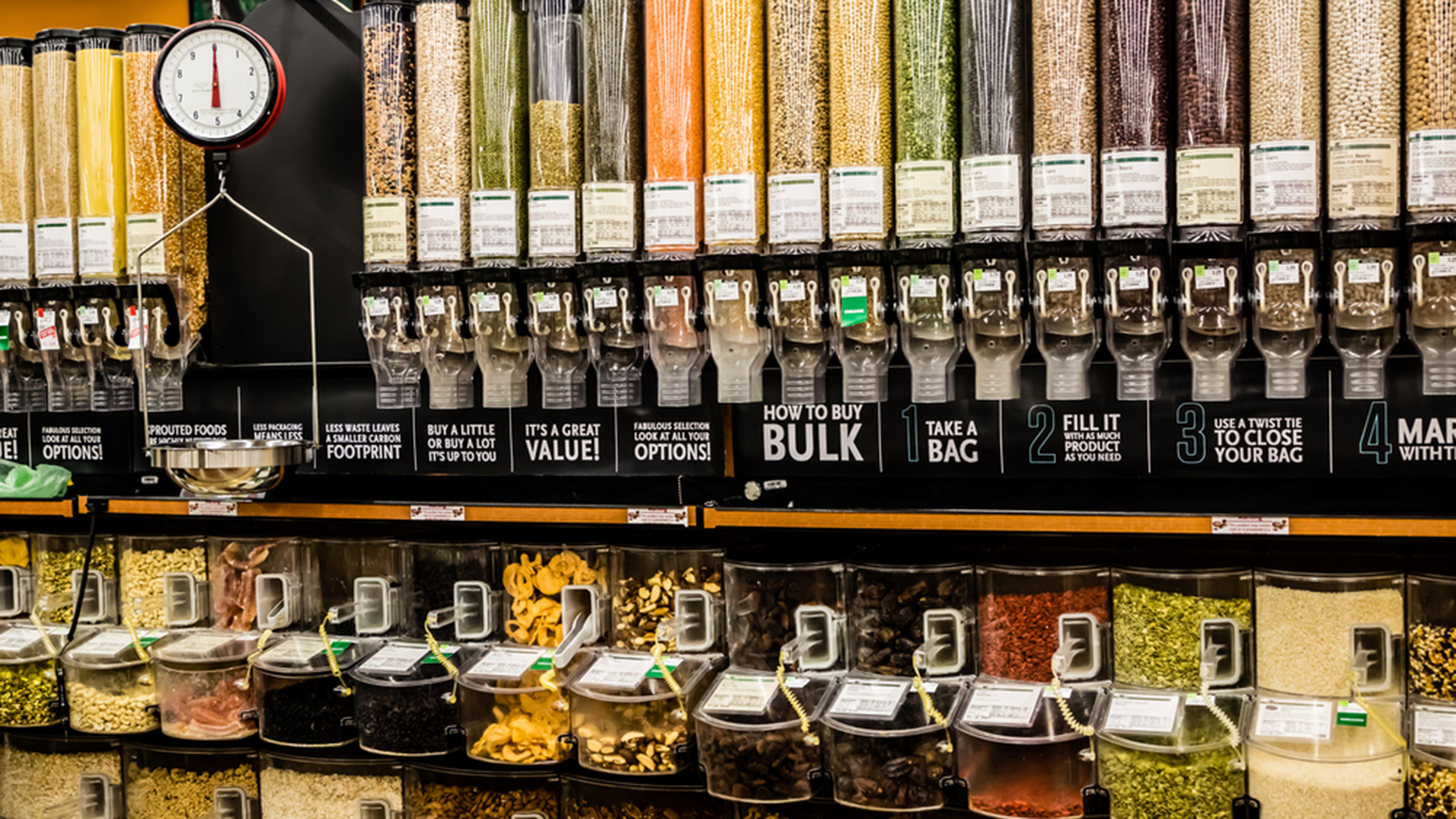
Image sourced from the Today Show.
Do you shop in bulk? Which foods do you buy in bulk? Why? The bulk foods aisle can be an unassuming section of the grocery store, but there is plenty to unpack when discussing these unpackaged grocery wares. “Buying in bulk” originated within the 1970’s co-op movement but has since been co-opted by major supermarket chains.
At its best, the bulk aisle is a place for consumers to access food products at a reduced price, without the added value of brand-names, packaging, and extraneous supply chain costs. The original ideologies promoted by bulk foods have persisted, but a growing concern about plastic waste is a primary motivator to consumers interested in buying in bulk. The structuring of the bulk section presents barriers to equal access by all consumers while it simultaneously markets bulk foods as a virtuous alternative, casting the consumer, not the grocer, as the agent responsible for sustainability.
How could bulk foods evolve with the competing demands of convenience and variety? The bulk aisle plays a role in the reduction of waste in the food system, but it also holds the potential to be reimagined in creative ways and become a more effective resource for consumers and producers. Classmate Lucy Ogburn and I chat for 20 minutes about the role of bulk foods in grocery stores today: who’s buying them, how much they cost, and where we can go from here.
Listen to our podcast: Unpacking Unpackaged Food, Lucy Ogburn and Helen McDonald (Archive, 2021)
Bibliography
Audacity Team (2021). Audacity(R): Free Audio Editor and Recorder [Computer application]. Version 3.0.0 retrieved October 27th, 2021, from https://audacityteam.org/.
Burnham, Ted. (2012). “Oh nuts! Buying Bulk Can Cost More But Saves Packaging.” The Salt, NPR. Retrieved October 26, 2021 from: https://www.npr.org/sections/thesalt/2012/04/03/149932940/oh-nuts-buying-bulk-can-cost-more-but-saves-packaging
ecfike. (n.d.). Grocery Store 2, Checkout. Freesound. Retrieved October 29, 2021, from https://freesound.org/people/ecfike/sounds/475704/
Johnson, S. L. (1984). Consumer Attitudes Toward Unpackaged Foods. Journal of Food Distribution Research, 15(1). https://econpapers.repec.org/article/agsjlofdr/26939.html
Le Gang. (2021, July 17). Swimming. Audio Library Plus. https://www.youtube.com/watch?v=x-Vf5eL4fWw
Rapp, A., Marino, A., Simeoni, R., & Cena, F. (2017). An ethnographic study of packaging-free purchasing: Designing an interactive system to support sustainable social practices. Behavior & Information Technology, 36(11), 1193–1217. https://doi.org/10.1080/0144929X.2017.1365170
Vann, Karine. (2019). “US Supermarkets Are Doing Bulk Foods All Wrong.” Civil Eats. Retrieved October 28, 2021, from:
https://civileats.com/2019/10/28/us-supermarkets-are-doing-bulk-food-all-wrong/
Vann, Karine. (2020). “Tech startups want to reinvent the bulk aisle–grocery’s most glorious, affordable, unwieldy section. That’s going to be harder than it looks.” The Counter. Retrieved October 25, 2021, from: https://thecounter.org/modernizing-bulk-grocery-supermarkets-tech-shopping/
Vraneševic´, T., & Stancec, R. (2003). The effect of the brand on perceived quality of food products. British Food Journal, 105(11), 811–825. https://doi.org/10.1108/00070700310511609

it seems like the bulk foods industry will either become more obsolete as time goes on or pivot and become relevant again!
I think you two covered many valuable points with depth in a short period of time. I enjoyed your bibliography too.